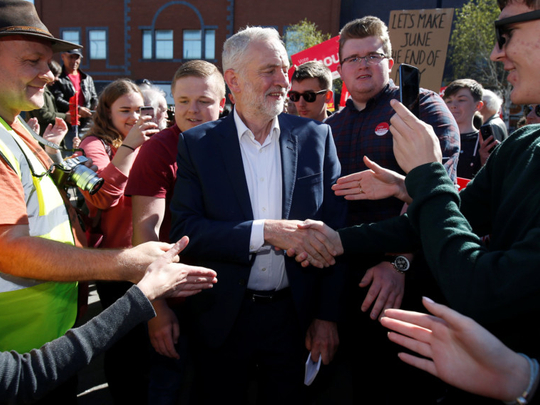
Those who orbit the Labour Party — either as MPs, pundits or affiliates — have become so obsessed with the fate of its leader that they have neglected one important fact as we enter this election: the party has half a million members.
What’s more, hundreds of thousands of people took part in Labour’s leadership election. In fact, a new study estimates the number of Labour-supporting non-members who took part in some kind of campaign activity during the 2015 general election in the region of 3.8 million.
Now I know what you’re thinking: despite the efforts of those 3.8 million people in 2015, Labour still lost. But the study counts “liking something on Facebook” and “retweeting something on Twitter” as campaign activity. Only 2 per cent of Labour-supporting non-members actually canvassed in 2015, and only a third of Labour members did.
What these figures — put together by the academics Tim Bale, Paul Webb and Monica Poletti — show us is not that on-the-ground campaigning makes no difference, but that more can be done to support the party as it enters the most difficult election it has taken part in for 30 years.
Those who voted for Jeremy Corbyn’s leadership must now put their money where their mouth is and explain to voters across the country why they think he would make a better prime minister. Labour supporters who dislike Corbyn must get a grip, and realise that complaining about the Labour leader should be put on hold in favour of halting Theresa May’s immigrant-bashing, NHS-destroying, welfare-cutting, Brexit shambles of a government. Big things are at stake here; there is no time for complacency, sulking or inaction. A lot of material harm will be done by a strengthened Tory government. It’s time to act.
Better induction needed
This goes both ways of course. It’s up to the Labour Party to direct people in the most useful way possible. For one thing, long-term members could do a better job of inducting new and enthusiastic activists in the ways of canvassing. I’ve been door-knocking for Labour many times, and I am still befuddled by the intricate data forms that are passed around, nervous about interrupting constituents’ evenings to talk about politics, and slightly alienated by the fact that it can sometimes feel as though you’re briefly joining a club where everyone else is closer to each other and more clued-up than you are.
In 2012 I went to the US as part of a delegation to the Democratic party, and went canvassing for Barack Obama in Virginia. I was given a long induction session and taken around by an experienced Democrat who helped me out with hostile voters. This is something Labour should emulate and build on.
Labour could also be more targeted in the way it uses activists. London Labour is a well-oiled machine with thousands of members who will often make their own way to marginal constituencies. But the party should emulate the Tories’ strategy in 2015 of targeting key demographics in important marginals across the country, and bussing activists out there. These could be fun day trips that are managed by party staff and long-term activists, possibly using a website to help people sign up and indicate when they are free, so they can be organised in the most useful, efficient way.
All canvassers would need to do is arrive at a meeting point in the morning and get schooled in the basics of canvassing on the way there. I am never happier to be used as a foot soldier than during election time, and there are surely millions of people out there who feel the same.
Encouraging people to campaign for the party at this crucial time also has implications beyond the election. In my experience, Labour members (of all persuasions) are a lovely bunch of people and canvassing is a rewarding and educational form of activism, even if a little nerve-racking. If the party were more strategic in the way it engaged with new members, it would have no trouble retaining them in the long term. This election could act as a starting point for building the broad-based, community-driven democratic party many people hoped for when they initially voted Corbyn into power.
I’m sure most Labour supporters were horrified by the prime minister’s election announcement, but now it’s here, the party must use it as the most powerful possible rallying cry — and then bring those who respond into the movement.
There’s no need to feel powerless. This election doesn’t have to be a portent of doom; we can use it as an opportunity to come together as people who want an open, inclusive, more socialist country. Not as saboteurs who must be crushed, but as a massive proportion of the population with a political voice that at long last insists on being heard.
— Guardian News & Media Ltd
Ellie Mae O’Hagan is an editor at openDemocracy and a freelance journalist writing mainly for the Guardian











